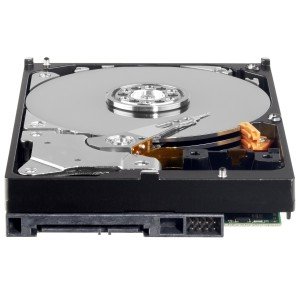
This article is part of Newb Computer Build’s “How to: Build a Gaming PC” guides to choosing your PC hardware for your Gaming PC builds. Here, you will find out how to choose a hard drive for your Gaming PC Build. Choosing a hard drive is one of the less complicated pieces of hardware to choose when building your own gaming pc, but there are a few terms you should be aware of, as well as a few factors you may want to keep in mind when purchasing a new hard drive.
In this article I will start off by describing what exactly a Hard Drive is, followed by the terms you should be familiar with when browsing for a new hard drive, and concluding with a few steps you should follow while looking for a new hard drive.
What is a “Hard Drive”

Terms you Should Know (For a Hard Drive):
Interface: This is the interface that your hard drive will use to connect to your
Capactiy: This is how much space your hard drive can actually hold. Most consumer desktops hard drives will be measured in Gigabytes, and the larger hard drives in terabytes. For a quick and easy understanding of what this means is 1 000 000 megabytes (Mb) = 1000 Gigabytes (Gb) = 1 Terabyte (Tb).
RPM: This is the “rotations per minute” that your hard drive is capable of performing. The faster the RPM (the larger the number) determines how fast data is capable of being accessed. Ideally you would want a hard drive with an RPM as fast as possible for using games. The RPM is only important in regular desktop hard drives, whereas the fastest hard drives available now are solid state drives which are explained below. (Some examples of hard drive RPM’s are 5400RPM, and 7200RPM)
Cache: The cache of a hard drive will be measured currently in megabytes (example: 64Mb) This cache is responsible for storing data temporarily for future use so that is can be accessed faster. So the more that is stored on the cache the faster program information can be accessed, and therefore an overall faster performance. Therefore a hard drive with a larger cache will perform more efficiently in accessing previously opened data.
Solid State Drive: Is a type of hard drive that is much more efficient at data access time with a ton of less latency, however this comes at a cost! Solid State Drives are much more expensive than your conventional hard drives per Gigabyte of data storage, and are therefore sold in smaller storage capacities. Some gamers (and other avid PC builders) will use a Solid State Drive to store their Operating Systems and most used software on which can provide impressive boot times, and loading times for their most used software.
Form Factor: The form factor of a hard drive simply states the size and shape of the hard drive. Most general dekstop hard drives will be 3.5″ while Solid State Drives will generally be smaller at around 2.5″. As with all computer hardware, make sure you have space in your computer case to put your new hard drive (which you most likely do if you are building a fresh PC, or only are purchasing one or two hard drives).
How to: Steps to Choosing Your Gaming PC Hard Drive:
Step One: Budget…err need?
As I always say start with budget for any PC hardware part. One of the easiest ways to skimp a few dollars is with a hard drive, because you can generally always buy another later on if you need more space! Why buy 2 TB worth of space if you will not fill it up right away? If you know you only have about 200 GB worth of data right now then why not wait until you fill up a newly purchased 500GB hard drive, and then purchase another hard 500GB or 1TB when you have more games, music, videos or whatever else you may have.
Step Two: Check the Interfaces on Your Motherboard!
When purchasing your new hard drive you want to know that it will fit. So make sure that your new (or old) motherboard has an open SATA 6Gb/s port if the new hard drive requires a SATA 6 Gb/s port.
Step Three: Choose a Hard Drive With Decent Speed and Cache
Hard Drives are becoming more and more complex (as in better!), which means higher RPM speed drives such as 7200 RPM are becoming more and more affordable. You will thank yourself later if you do allot of gaming for doing this. This is not to say purchasing a slower 5200 RPM drive will have any dramatic effects in your overall PC gaming experience, and also does not mean you have to splurge for a 500GB Solid State Drive monster (these easily go for $600+ right now), but this currently would be a definite best bang for your buck decision.
Conclusion:
Well I hope that this article gives you a clearer understanding when searching for a new hard drive for your gaming PC build. There are only a few technical factors like storage size, RPM, and cache to looking for when shopping for a new hard drive, so once you have a good understanding of those terms, buying a new hard drive should be no sweat!
If you have any more question please do not hesitate to leave a comment and ask any questions you like.
And now finally, if you are interested in in building a Gaming PC please check out Newb Computer Build’s Gaming PC Builds of the Month.
OR if you need help choosing more hardware for your gaming PC build check out How to: Build a Gaming PC

Comments 1
Pingback: How to: Choose a Hard Drive for Your Gaming PC Build | Music Education Articles